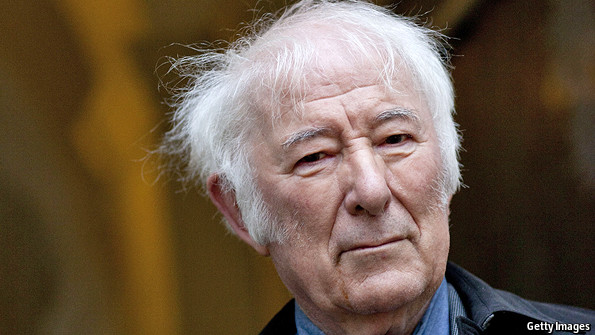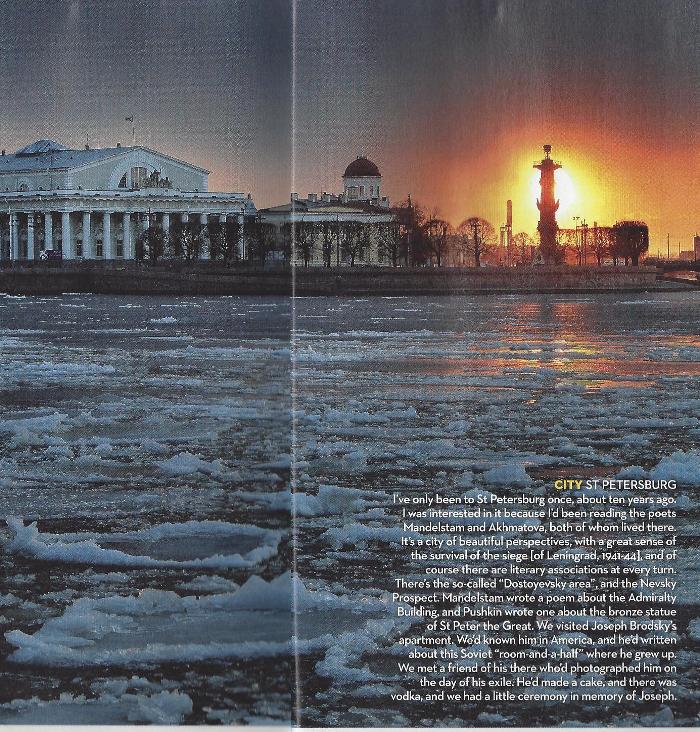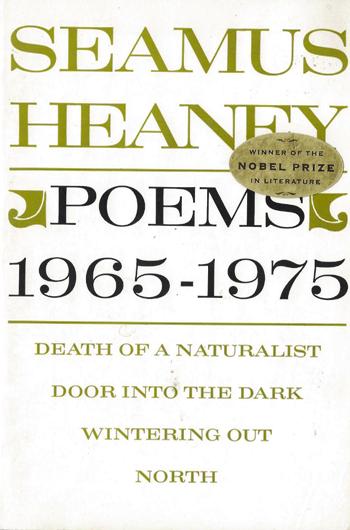
WHEN Seamus Heaney began writing poetry, during his years studying to be a schoolteacher in the 1960s, he used the pen-name “Incertus”, meaning “uncertain”. Later, he would describe himself as “a shy soul fretting and all that”. As an older man with an illustrious career behind him his gentle voice could still be mistaken for shyness. When I saw him give a lecture at Cambridge University on the importance of peaty bogs in his work he stood tall yet slightly stooped over a lectern, quietly capturing the audience's attention with his self-deprecating dry humour.
Yet there is little that is hesitant in his poems. “Between my finger and my thumb / The squat pen rests; snug as a gun.” So opens “Digging”, the first poem in “Death of a Naturalist” (1966), his first, dazzling collection. The poem would go on to be studied in schools and endlessly quoted in articles about Heaney, who won the Nobel prize in literature in 1995. Rightly so—in 31 lines Heaney confidently captures the mixture of lyrical observation and matter-of-factness that went on to characterise his work.
Heaney's language is spare and to the point, yet his poems are full with texture. He later wrote that “Digging” was the first poem “where I thought my feelings had got into words, or to put it more accurately, where I thought my feel had got into words.” It was this knack for conveying “the feel” of a thing that marks Heaney out as one of the major poets of the 20th century.
Born in 1939 in County Derry in Northern Ireland Heaney grew up in a rural farmstead, his family crammed into three rooms. As he described it in his Nobel prize speech: “It was an intimate, physical, creaturely existence in which the night sounds of the horse in the stable beyond one bedroom wall mingled with the sounds of adult conversation from the kitchen beyond the other”. The beauty of the Irish landscape recurs throughout his work. He watches his father till the earth and observes potato diggers stopping for their lunch-break. But life is not romanticised. Everyday harsh realities are turned into lyric poetry—farmers drown kittens and dead turkeys are slapped upon the cold marble slabs of a table.
Over 12 collections of poems this rustic upbringing is never far away. But the collection that made his name, “North” (1975) touches on another aspect of contemporary Ireland that has rarely been so well articulated. Describing the sectarian conflict of the 1970s and 1980s, poems such as “Whatever You Say Say Nothing” capture the impossibility of putting such violence into words: “The famous / Northern reticence, the tight gag of place / And times”. “Smoke-signals are loud-mouthed compared with us”, he writes. Few wrote so well and with such nuance about the Northern Irish Troubles.
Along with his poetry, Heaney was also an excellent translator (having studied Latin and Anglo-Saxon at Queen’s University in Belfast). His translation of the Anglo-Saxon poem “Beowulf” in 1995 brought it to a new audience, as did his 2009 version of the little-known, but brilliant medieval Scots poem by Robert Henryson, “The Testament of Cresseid”. His translations of Greek plays, such as “The Burial at Thebes” (adapted from Sophocles’s “Antigone”) and “The Cure at Troy” (a version of Sophocles's “Philoctetes”) subtly interwove differing voices, bridging the gap between poetry and plays. And as a lecturer at Harvard and Oxford (where he was Professor of Poetry from 1989 to 1994) he was a brilliant teacher. His criticism sparkles with the combination of plain speaking and acute observation so familiar in his poems.
Last year I heard Heaney speak again in London. Older, and slightly more frail, his muscular poems still shone out in the darkness of an auditorium. From his last collection, “Human Chain” (2010), he read a poem written in memory of his friend David Hammond. It begins: “The door was open and the house was dark / Wherefore I called his name, although I knew / The answer this time would be silence”. Although death has now silenced Heaney, his voice will live on.


